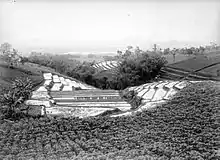Cisarua
Cisarua is a location and district in the Bogor Regency, located in the province of West Java, with a population of 112,655. The district is famous for its mild climate, tea fields, and stunning views, being located in a rather high altitude.
Cisarua | |
|---|---|
| Coordinates: 6.680°S 106.932°E | |
| Country | |
| Province | West Java |
| Regency | Bogor Regency |
| Area | |
| • Total | 63.73 km2 (24.61 sq mi) |
| Population (2019 [1]) | |
| • Total | 118,720 |
| • Density | 1,862.85/km2 (4,824.8/sq mi) |
| Time zone | UTC+7 (IWST) |
| Area code | (+62) 251 |
| Vehicle registration | F |
| Website | kecamatancisarua |

Near the district is a mountain pass famed for housing villas, hostels, as well as a well-known "heritage" hotel known as the "Puncak Pass", built primarily back in the colonial era, in the year 1928.[2]
Cisarua is also known for having a sizeable population of asylum seekers and refugees, mainly coming from Afghanistan and Pakistan, as well as ones coming from parts of Africa, mainly from Sudan, Egypt, and Somalia. The reason why many asylum seekers has sought refuge here is because of the relatively cool temperatures, as well as its location being close to the UNHCR offices in the capital Jakarta, which are located roughly about 72 kilometres north of the district.
Cisarua also attracts many tourists from the Middle East, many coming from Saudi Arabia, with reasons of coming similar to the ones with the asylum seekers. Because of the number of Arab migrants and tourists, the district is often called as the "Kampung Arab".[3][4]
History
Back at the Dutch colonial era, the area is called "Tjisaroea", and between 1945–1949 Indonesian National Revolution the Royal Netherlands East Indies Army (KNIL) maintained a prison camp for soldiers convicted of breaches of military discipline.
The most well-known of those imprisoned there was Poncke Princen, who in 1947 served four months at the Tjisaroea Prison Camp on charges of desertion and later went over to the Indonesian National Armed Forces.


